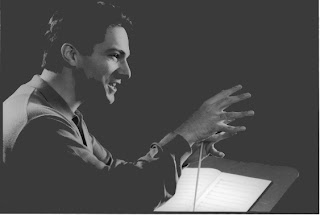This weekend Penny Lazarus will perform a selection of art songs in "for the love of singing,” an aptly named program, at Governor's Academy. Which may seem like a strange place for her to be if you only know Lazarus from her other roles — as a piano teacher or opening night arm candy for Port playwright Joshua Faigen or even as "the well-known creative mind," as the Nock School newsletter puts it, behind the transformation of the Nock courtyard. But the May 2 recital with Amesbury singer Louise Cramer actually represents something of a creative plateau in a long process
The Merrimac Street resident has been singing all of her life, but the piano won the musical argument early on because ... well, because as much as Lazarus loved singing, as much native talent as she had, she didn’t have the chops, the combination of clarity and athleticism needed to get over the top — to get beyond good. That didn’t happen until Dr. Gerald Weale, the guy with the baton at the Newburyport Choral Society, got ahold of her at a workshop/coaching session and taught her some tricks of the trade, and then pushed her on to what would become five years, so far, of private studies with one of the area's leading vocal coaches. And, of course, none of that would have happened if her hubby hadn't tipped over the family cart, about a decade ago, taking a job in Massachusetts, presenting the move from Pittsburgh as a fait accompli. He wasn't a playwright then, just a type geek — er, typographer. The whole playwright thing wasn't on anyone's radar until they settled down next door to local theater mucky-mucks Ron Pullins and Leslie Powell.
Lazarus, who grew up in Pittsburgh, “was heartsick” at the idea of leaving her friends and family, her turn-of-the-century Victorian home and garden. The first thing she did (after cooling down, of course) was research what would become her new stomping ground — and found the Newburyport Choral Society. It was, as far as she was concerned, “the only carrot” in the whole deal. Faigen accepted the job in the summer, the family settled into their new home on Merrimac Street, and Lazarus started rehearsing with NCS, and launching the Northeast edition of her piano studio, in September. She credits Weale, professor emeritus at Boston University who, in two decades-plus as NCS conductor, has developed a reputation for shaping the emotional and dramatic content of singers' work, for taking her singing to the next level ("I was hitting two Cs above middle C — and it was easy," she says) and encouraging her to work with a private teacher, which brought Lazarus to Martha Peabody — a singer, educator and lecturer for the past 25 years. Since then Lazarus has found her way to the stage as a singer, playing the Widow Corney in the Anna Smulowitz production of “Oliver” last year and in the last two Theater in the Open productions of “A Christmas Carol.” (The Dickens story mentions music, but productions rarely play up what should be an obvious opportunity to play to the audience. Background carolers had already been incorporated into the TITO production. In last year’s show, Lazarus sang “Lulay” as Christmas Future is dishing out the bad news to old Scroogie, although you might not have known that unless you were paying attention to the program notes: A group of singers is gathered around the grave, all dressed in black.) And just last week she sang an arrangement of Emily Dickinson's “Love Stricken, Why?” during the Your Favorite Poem event at the Firehouse.
But why? Why would someone steeped in the fields of music and education, with decades of experience with the piano, take such a creative left turn as an adult to reinvent herself as a vocalist?
"The piano is a wonderful instrument," she says. "You can let a lot of emotion go with it. I’ve performed and taught the piano for 30 years, but when I sing, I am the instrument — and it’s the most intimate musical experience one can have.”
This weekend, Lazarus's musical journey brings her to the gorgeous, acoustically pristine Moseley Chapel at The Governor's Academy for the recital with Cramer, a soprano. Cramer will tackle the work of modern French composers like Eric Satie and Francis Poulenc, and Lazarus, a mezzo-soprano with a dark, chocolaty voice, will perform the dark, soul-searching Mahler — really emotional, deep stuff there. Everyone should recognize the Copland ("It's a Gift to be Simple," "Hush a Bye"). Lazarus will also perform a comic duet with a Governor's Academy student, Kim Uggerholt — Irving Berlin’s “You're Not Sick, You're Just in Love,” with its still-mysterious reference to a red velvet glove. Barbara Flocco will accompany the singers on piano.
JUST THE FACTS, MAN: Louise Cramer and Penny Lazarus will present "for the love of singing," a celebration of the human voice, at 4 p.m. May 2 at Moseley Chapel at The Governor’s Academy in Byfield. The concert is free. Donations will be taken for Our Neighbors’ Table. A reception will follow the performance. For more information call 978.462.4720 or visit www.pennylazaruspianostudio.com. The photo of Lazarus is courtesy of Rebecca Wish Esche.

















